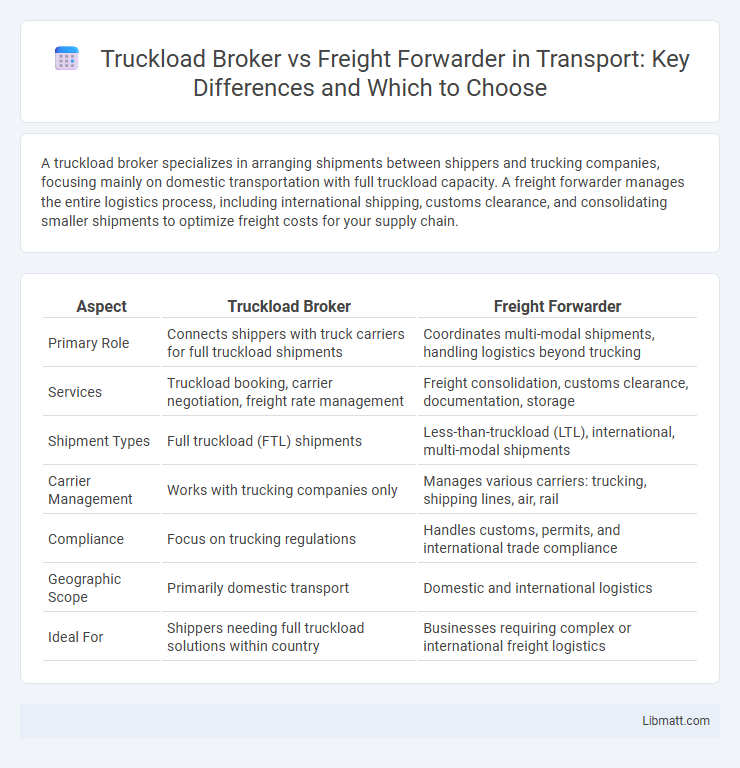A truckload broker specializes in arranging shipments between shippers and trucking companies, focusing mainly on domestic transportation with full truckload capacity. A freight forwarder manages the entire logistics process, including international shipping, customs clearance, and consolidating smaller shipments to optimize freight costs for your supply chain.
Table of Comparison
| Aspect | Truckload Broker | Freight Forwarder |
|---|---|---|
| Primary Role | Connects shippers with truck carriers for full truckload shipments | Coordinates multi-modal shipments, handling logistics beyond trucking |
| Services | Truckload booking, carrier negotiation, freight rate management | Freight consolidation, customs clearance, documentation, storage |
| Shipment Types | Full truckload (FTL) shipments | Less-than-truckload (LTL), international, multi-modal shipments |
| Carrier Management | Works with trucking companies only | Manages various carriers: trucking, shipping lines, air, rail |
| Compliance | Focus on trucking regulations | Handles customs, permits, and international trade compliance |
| Geographic Scope | Primarily domestic transport | Domestic and international logistics |
| Ideal For | Shippers needing full truckload solutions within country | Businesses requiring complex or international freight logistics |
Understanding Truckload Brokers: Definition and Role
Truckload brokers act as intermediaries who connect shippers with carriers to arrange full truckload shipments efficiently, ensuring optimal routing and cost management. They leverage extensive carrier networks and industry knowledge to negotiate rates, handle documentation, and provide real-time shipment tracking, enhancing supply chain reliability. Your business benefits from truckload brokers by gaining access to a wide range of transportation options without managing fleets directly.
What Is a Freight Forwarder? Key Functions Explained
A freight forwarder acts as an intermediary between shippers and carriers, managing the logistics of transporting goods globally. Key functions include arranging cargo consolidation, documentation, customs clearance, and selecting optimal shipping routes to ensure timely delivery. You benefit from their expertise in navigating complex international shipping regulations and coordinating multiple transit modes efficiently.
Core Differences: Truckload Brokers vs Freight Forwarders
Truckload brokers specialize in arranging full truckload shipments within domestic markets, connecting shippers directly with carriers for efficient freight movement. Freight forwarders manage a wider range of logistics services, including consolidating shipments, handling international transportation, and offering customs clearance expertise. Understanding these core differences helps you select the best partner for your specific shipping needs and supply chain complexity.
Licensing and Regulatory Compliance
Truckload brokers must obtain a Federal Motor Carrier Safety Administration (FMCSA) license known as a Motor Carrier (MC) number and maintain a surety bond or trust fund to operate legally. Freight forwarders also require an MC number but often hold additional licenses such as the Ocean Transportation Intermediary (OTI) license for international shipments, ensuring compliance with both domestic and international regulations. Both entities must adhere to strict regulatory standards, including maintaining proper insurance coverage and filing necessary reports to ensure lawful freight operations.
Service Offerings and Capabilities
Truckload brokers specialize in arranging full truckload shipments directly between shippers and carriers, optimizing for cost-efficiency and timely delivery on domestic routes. Freight forwarders provide comprehensive logistics solutions, including consolidation, customs clearance, and multimodal transport management, making them ideal for complex international shipments. Both facilitate supply chain efficiency but differ in scope, with freight forwarders offering broader capabilities across global markets.
Handling International vs Domestic Shipments
Truckload brokers primarily handle domestic shipments by connecting shippers with carriers to transport full truckload freight within a single country, ensuring efficient route management and local compliance. Freight forwarders specialize in international shipments, managing complex logistics across borders including customs clearance, documentation, and multimodal transportation to streamline global trade. Your choice depends on whether your shipment requires expertise in navigating international regulations or efficient domestic truckload distribution.
Pricing Structure and Cost Comparison
Truckload brokers typically charge a commission based on a percentage of the carrier's freight rate, offering more transparent pricing directly tied to the shipment size and distance. Freight forwarders often employ a bundled fee structure that includes handling, documentation, and multimodal transport coordination, potentially increasing overall costs but providing comprehensive logistics solutions. Cost comparison depends on shipment complexity and volume, with truckload brokers favoring single-mode, large shipments and freight forwarders benefiting multi-leg or international freight requiring consolidation and customs handling.
Technology and Tracking Solutions
Truckload brokers leverage advanced digital platforms and real-time tracking systems to optimize load matching and provide shippers with dynamic updates on cargo status. Freight forwarders utilize integrated global tracking solutions and supply chain management software to coordinate multimodal shipments and ensure visibility throughout the transportation process. Both entities increasingly adopt AI-driven analytics and IoT devices to enhance shipment monitoring, route optimization, and proactive problem-solving.
Selecting the Right Logistics Partner for Your Business
Choosing between a truckload broker and a freight forwarder depends on your business's shipping needs and routes. Truckload brokers specialize in connecting shippers with carriers for full truckload shipments across specific regions, offering cost-effective and direct transportation solutions. Freight forwarders provide comprehensive international shipping services, managing multiple modes of transport and complex customs processes to ensure your cargo reaches its global destination efficiently.
Pros and Cons: Truckload Broker vs Freight Forwarder
Truckload brokers offer direct access to carrier networks, providing cost-effective, flexible shipping solutions for large volume shipments, but may lack comprehensive international logistics expertise. Freight forwarders excel in managing complex global supply chains with services like customs clearance and multi-modal transport, though their fees can be higher and processes more intricate. Choosing between the two depends on shipment scale, required logistics services, and destination complexity.
truckload broker vs freight forwarder Infographic

 libmatt.com
libmatt.com